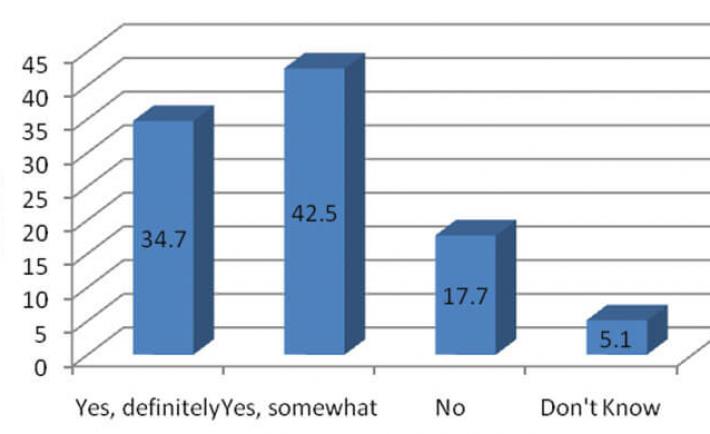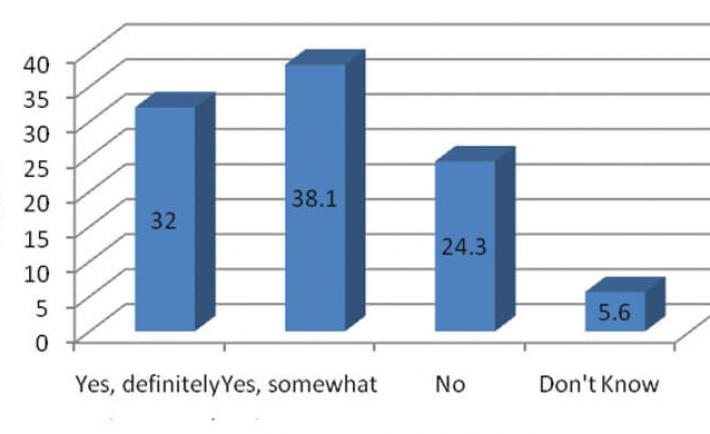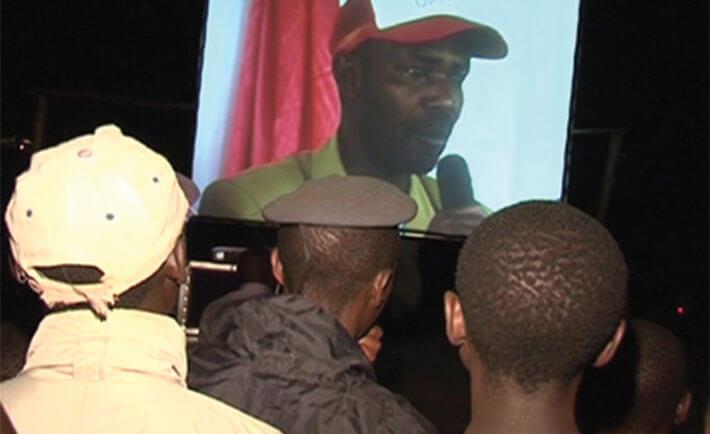Measuring Impact
Systematic information on debates can be a useful means to demonstrate their positive impact. Such data can be shared with political and civic leaders, the media, the general public and funders underwriting the debates. Because debates usually are media events, the forums also lend themselves to aspects of quantitative measurement. This includes the ability to ascertain the size of the viewing and listening audiences and the impact of debates on informing a voter’s decision-making. Depending on available resources, debate sponsors have used a variety of approaches to capture this information:
- Public Opinion Surveys — Sponsors can contract polling for debates that were broadcast on radio and television to quantify the size of the audience and how it compares to other popular broadcasts. Surveys can also assess how people think the debate influenced their knowledge of the candidates and help solicit suggestions for improving future debates. (See Example: Debate Polling Questions);
- On Site Audience Surveys — Conducting exit interviews with a sampling of the audience members to capture their reactions at the debate venue can also provide useful feedback;
- News Coverage — Sponsors can measure the number of stories in the print and electronic media to compare the debate’s impact with other major news events;
- Post-Debate Structured Interviews — Have public opinion researchers discuss debates with candidates and political and civic leaders as well as academics to get their assessment of the impact of the events;
- In-Home Ratings — Use independent commercial audience measurement services (e.g., Nielsen-style television ratings) services to collect data on television viewers; and
- Internet — Collect viewership numbers for those accessing the debate via the web, especially those tuning into streaming video from abroad.
In addition, for countries where Internet access and use of social media is prevalent, a range of approaches, such as Crimson Hexagon, can be used to complement traditional data collection methods outlined above. Although these tools have limitations, such as measuring only Internet users rather than a statistically representative sample of the population, they can provide data from web-based interactions such as live streaming video of debates, Twitter, Facebook or other social media.
Voter Education
Debate organizers in a range of countries have developed creative ways to make debates more than a one day event to maximize the ability to inform voters and engage people in the country’s election process.
Debate Watch Events
Sponsors can provide organizing materials and encourage civic partners, schools and the general public to hold debate viewing parties. These can be festive social opportunities for people to watch or listen to the debate together in places ranging from someone’s home to a community center or an outdoor screening. After the debates, the participants can take part in a facilitated discussion to share their reactions. In countries with rural populations with limited access to electronic media, some debate sponsors have arranged to bring in mobile projectors and screens to show debates in communities that would not normally have access to television. These have proven to be popular, informative events in countries such as Burundi and Haiti. (Example: Debate Watch Event.)
Voter Issue Guides
Debate organizers can create materials to help the audience analyze the content of the debate and evaluate whether the candidates addressed the issues that most matter to them. These guides can be printed and distributed in communities, made available for downloading on the sponsor’s website or included as a newspaper supplement, among other options.
Social Media
Sponsors can organize social media activities to engage voters, particularly youth. This can include: facilitating Twitter discussions, hosting Google Hangouts where citizens can watch and discuss debates, or even sponsoring YouTube competitions on presentations on election issues.
Community Activities
Debates can serve as a catalyst for a wide range of related cultural and educational activities. Schools hosting U.S. general election presidential debates, such as Hofstra University, have organized more than 100 debate-related activities, including volunteering opportunities, special academic courses, speaker series, voter registration drives, on-line activities and debate watch parties, among others.1
Debate groups have explored ways to continue to stage debates to inform the public and solidify their public positioning as effective, impartial sponsors for future elections.
Between-Debate Activities
One of the challenges faced by debate sponsors in building a culture of debate is the period between elections. Debate groups in many countries have explored ways to continue to stage debates to inform the public and solidify their public positioning as effective, impartial sponsors for future elections.
Create a Debate Resource Center
Debate groups can expand the content of their websites, including practical guides to organizing debates and information on past debates, such as news stories, photos, videos and transcripts that can be used by academics, journalists,and good government watchdog groups to hold elected officials accountable.
Hold Post-Election Accountability Debates
Building on debates held during election campaigns, sponsors in several countries have organized forums with elected officials after they have been in office for a period to hold them accountable to their promises. The events use a debate format to bring together elected officials and representatives of opposition parties to discuss their performance to date. Forums held by the Colombian Political Debate Commission of Bolivar (Comision de Debates Politicos de Bolivar), the Serbian group, Center For Free Elections and Democracy (Centar za slobodne izbore i demokratiju, CeSID) in partnership with RTV television station, and the Guatemalan Managers Association (Asociación de Gerentes de Guatemala, AGG) are good examples of these events.2
Sponsor Legislative Issue Debates
Debate groups have also helped foster public engagement in ongoing policy debates in national legislatures. At these broadcast forums, elected officials or party leaders are invited to share their positions on issues and bills presently being considered using a debate format.
Organize Youth/Student Debate Programs
To promote a culture of debate, sponsors can also work with schools or youth to organize academic debate competitions. In some cases, sponsors loan podiums from past high level political debates for students to use to help build excitement and tie into candidate debates. The Open Debating Society of Afghanistan Organization, for example, takes part in national and international debate competitions.3
Convene Post-Election Debate Lessons Symposium
Debate groups can convene political and civic leaders and academics to discuss the impact of debates and offer recommendations for improving debates going forward. These forums also provide an opportunity to present results of research, such as public opinion surveys, that underscore the benefits of debates.
Multiple Debates
Some debate sponsors may seek to organize multiple series of debates for local, state and legislative offices during an election. This presents additional logistical challenges of pulling together the forums simultaneously or within a compressed timeframe. Hurdles can include identifying multiple venues, preparing moderators and ensuring debates are professionally organized. Lessons on organizing multiple debates from a range of countries include:
- Take an “economy of scale” approach and develop standard formats, materials and trainings for organizers and moderators for all the planned debates;
- Consult with national political party leaders and election authorities to inform them of debate plans and elicit their support in addition to approaching individual candidates;
- Develop uniform written materials that outline the specifics of the debates — including the format and rules as well define the roles of a moderator, among other areas;
- Prepare a standard rules document that candidates may sign before participating; and
- Form a mobile logistics team to assist with debates in each locale to ensure quality control of the arrangements.
Debate Alternatives
If debates are not feasible among candidates for political, financial or organizational reasons, sponsors may consider alternative forums. While not always a candidate debate per se, these events can help inform the public while also contributing in the long-term to building a culture of debate:
Debates with Party Leaders or Issue Experts
As an alternative to candidates, debate sponsors can invite a candidate’s policy experts to debate specific issues such as housing, health care, economics, etc. Party leaders can similarly be invited to debate the candidate’s position on campaign issues.
Candidate Forums
At these events, candidates are invited to present their qualifications, policy platforms and potentially respond to a few questions from the audience or a moderator. In contrast to a debate, there is generally no interaction among candidates — such as direct questions or rebuttals.
Parallel Interviews
In collaboration with a debate sponsor, journalists can conduct a series of taped interviews with candidates where they ask similar, comparable questions. The interviews can then be combined and broadcast together as one program.
Countries have taken a variety of approaches to institutionalizing debates from a legal perspective. These approaches include the following.
Laws and Regulations
Set Requirements for Debate Organizers
Some countries establish criteria for organizations seeking to sponsor candidate debates. In the U.S., for example, the Federal Election Commission, a government regulatory body, regulates the types of groups that can organize debates (e.g., media outlets or nonprofit groups) and requires that sponsors have pre-published objective criteria for determining the candidates who are invited to debate.
Mandate Debates
In countries such as Mexico and South Korea, election authority regulations mandate that candidate debates take place. Depending on the country, the regulations can set out parameters, including: sponsors, timeframe, format, and the production and dissemination of the debate broadcast. However, while debates are required to be held, candidates are not legally obliged to take part.
Require Candidates to Debate
A law passed in Argentina’s Chaco province mandates that debates are organized by election authorities and that candidates take part or face sanctions, such as the loss of public campaign funding. Similar efforts in other countries, such as Uruguay, to mandate debates have been rejected due to resistance from elected officials and concerns about potential violations of freedom of speech.
- 1. For more information see http://www.hofstra.edu/debate/
- 2. Comisión de Debates Politicos de Bolivar; Center For Free Elections And Democracy; and Guatemalan Managers Association.
- 3. The Open Debating Society of Afghanistan Organization (www.odsao.org).



